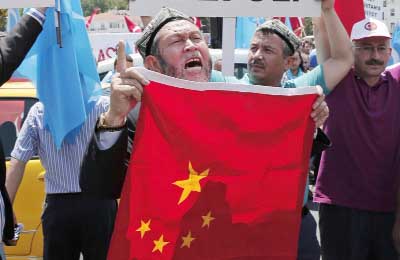
AP, Istanbul :
The Chinese interrogators held burning cigarettes to Ali’s face, tied him against a tree and beat him as they tried to get the Uighur farmer to say he took part in an ethnic riot that killed dozens in western China.
That winter night in the Chinese city of Kashgar in 2009 set Ali on a path that ended in northern Syria where he picked up a Kalashnikov rifle under the black flag of jihad and dreamed of launching attacks against the Chinese rulers of his homeland.
Since 2013, thousands of Uighurs, a Turkic-speaking Muslim minority from western China, have traveled to Syria to train with the Uighur militant group Turkistan Islamic Party and fight alongside al-Qaida, playing key roles in several battles. Syrian President Bashar Assad’s troops are now clashing with Uighur fighters as the six-year conflict nears its endgame. But the end of Syria’s war may be the beginning of China’s worst fears.
“We didn’t care how the fighting went or who Assad was,” said Ali, who would only give his first name out of a fear of reprisals against his family back home. “We just wanted to learn how to use the weapons and then go back to China.”
Uighur militants have killed hundreds in attacks inside China in a decades-long insurgency that targeted symbols of Chinese authority and, in recent years, civilians.
China is also a victim of terror, its officials say, and Uighur men are influenced by global jihadi ideology. Muslims in the Uighur homeland of Xinjiang, as one Chinese official declared in August, “are the happiest in the world.”
But rare and extensive Associated Press interviews with nine Uighurs who had left China to train and fight in Syria showed that Uighurs don’t neatly fit the profile of fighters answering the call of jihad.
There was a police trainer who journeyed thousands of miles with his wife and children to Syria, a war zone. A farmer who balked at fundamentalist Islam even though he charged into battle alongside al-Qaida. A shopkeeper who prayed five times a day and then at night huddled with others in a ruined Syrian neighborhood to study Zionist history.
And there was Ali, a short, soft-spoken 30-year-old with a primary school education who knew little of the world beyond his 35-acre farm when he left China.
For Uighurs like Ali, China had become unlivable since the government launched an expansive security crackdown in Xinjiang after the 2009 ethnic riots in Urumqi, the regional capital, that killed nearly 200 people.
The Chinese interrogators held burning cigarettes to Ali’s face, tied him against a tree and beat him as they tried to get the Uighur farmer to say he took part in an ethnic riot that killed dozens in western China.
That winter night in the Chinese city of Kashgar in 2009 set Ali on a path that ended in northern Syria where he picked up a Kalashnikov rifle under the black flag of jihad and dreamed of launching attacks against the Chinese rulers of his homeland.
Since 2013, thousands of Uighurs, a Turkic-speaking Muslim minority from western China, have traveled to Syria to train with the Uighur militant group Turkistan Islamic Party and fight alongside al-Qaida, playing key roles in several battles. Syrian President Bashar Assad’s troops are now clashing with Uighur fighters as the six-year conflict nears its endgame. But the end of Syria’s war may be the beginning of China’s worst fears.
“We didn’t care how the fighting went or who Assad was,” said Ali, who would only give his first name out of a fear of reprisals against his family back home. “We just wanted to learn how to use the weapons and then go back to China.”
Uighur militants have killed hundreds in attacks inside China in a decades-long insurgency that targeted symbols of Chinese authority and, in recent years, civilians.
China is also a victim of terror, its officials say, and Uighur men are influenced by global jihadi ideology. Muslims in the Uighur homeland of Xinjiang, as one Chinese official declared in August, “are the happiest in the world.”
But rare and extensive Associated Press interviews with nine Uighurs who had left China to train and fight in Syria showed that Uighurs don’t neatly fit the profile of fighters answering the call of jihad.
There was a police trainer who journeyed thousands of miles with his wife and children to Syria, a war zone. A farmer who balked at fundamentalist Islam even though he charged into battle alongside al-Qaida. A shopkeeper who prayed five times a day and then at night huddled with others in a ruined Syrian neighborhood to study Zionist history.
And there was Ali, a short, soft-spoken 30-year-old with a primary school education who knew little of the world beyond his 35-acre farm when he left China.
For Uighurs like Ali, China had become unlivable since the government launched an expansive security crackdown in Xinjiang after the 2009 ethnic riots in Urumqi, the regional capital, that killed nearly 200 people.

